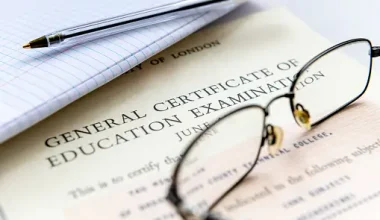The night before an exam can feel like the final scene in a movie – a mix of tension, anticipation, and a touch of excitement.
It’s when all your hard work and late-night study sessions culminate into one defining event, and how you handle yourself the night before an exam can significantly impact your exams the next day.
To help you understand the best practices you should imbibe the night before your exam, our article will explore how to revise the night before an exam.
This guide will be your guiding star through these calm yet crucial hours. We’ll explore how to gracefully navigate last-minute revisions, blending education with a touch of wit, and turning the night before the exam into a scene of confident tranquility.
Table of contents
- Preparing for a GCSE Exam
- How Do You Deal With the Night Before Exam?
- Should You Revise the Night Before an Exam?
- How Long Should You Revise the Night Before an Exam?
- How to Revise the Night Before an Exam
- What Not to Do the Night Before an Exam
- FAQs
- How To Revise The Night Before An exam: Conclusion
- References
- Recommendations
Preparing for a GCSE Exam
Preparing for a GCSE exam is akin to orchestrating a well-choreographed symphony. It entails a harmonious blend of understanding, organization, and effective time management.
Begin by acquainting yourself with the exam’s format and syllabus – the cornerstone of your preparation. Break down complex subjects into digestible portions, making the learning journey less daunting.
Organize your notes, resources, and study materials, creating a symmetrical structure for easy access. Allocate time wisely, dedicating moments to each subject while allowing breaks to prevent mental fatigue.
Practice past papers to acclimate to the exam’s cadence and hone your answering finesse. Engage in group discussions for diverse perspectives and clarity.
Lastly, embrace a healthy lifestyle. Sleep, nutrition, and exercise compose the rhythm section of your success melody.
Experiencing setbacks in GCSE? Here’s Why Many Fail GCSE Exams in 2024
How Do You Deal With the Night Before Exam?
The night before the exam is akin to the calm before the storm – a blend of nerves and readiness. To navigate this delicate juncture, start with a review, not a cram.
Skim through keynotes, refresh your memory, and avoid diving into new material. Keep your atmosphere serene – a tidy workspace, dim lights, and a soothing ambience. A light, nutritious meal fuels your brain without inducing a food coma.
To settle your mind, engage in active relaxation, perhaps light reading or meditation. Strategize your exam day – set multiple alarms, double-check stationery, and chart your route.
Pack your bag with essentials, eliminating morning rush panics. But here’s the twist: declare an “information embargo” an hour before bed. Let your brain unwind with leisure, enabling you to wake up sharp.
Remember, sleep is your ally, not your enemy. Aim for a solid 7-8 hours of rest. When well-rested, your mind orchestrates its grand performance.
So, embrace the night calmly, knowing you’ve prepared and tomorrow’s test is another victorious challenge on your journey.
Should You Revise the Night Before an Exam?
Should you revise the night before an exam? It’s a question that has crossed every student’s mind. The answer, much like a thoughtful equation, lies in balance.
The night before an exam isn’t meant for cramming all the knowledge you’ve accumulated over time. Rather, it’s a time for gentle review and mental relaxation.
Your brain is like a sponge that needs time to absorb and solidify information. Instead of overwhelming it with last-minute facts, briefly revisiting key concepts can reinforce your understanding and boost your confidence. This review is more about refreshing your memory than learning anew.
Moreover, a good night’s sleep is a treasure you shouldn’t compromise. Sleep helps consolidate memories and enhance cognitive functions, which is critical for optimal exam performance.
Trying to cram too much can lead to stress, fatigue, and a mind too cluttered to function at its best.
The night before the exam is a time for subtle reassurance, a chance to whisper to your brain, “You’ve got this.”
Trust the process and give yourself the mental and physical rest you need to shine on exam day.
Also, read GCSE 2024: Why I need to write a GCSE in 2024
How Long Should You Revise the Night Before an Exam?
The night before an exam, revision should be purposeful and not excessive. It’s a delicate balancing act between reinforcing your knowledge and ensuring a rested mind. Aim for a focused revision session of about 1 to 2 hours, divided into smaller intervals with breaks in between.
Spending too long revising can lead to diminishing returns. The brain’s capacity to absorb and retain information has its limits. Extended sessions can result in fatigue, diminishing concentration, and even increased stress as you realize time is slipping away.
Shorter, concentrated bursts of revision, on the other hand, keep your mind engaged and alert. Reviewing key concepts, formulas, or summaries during these intervals can help reinforce your understanding without overwhelming your cognitive faculties.
Remember, the night before the exam isn’t meant to learn new material; it’s about reassuring yourself and maintaining a calm disposition. A solid night’s sleep is the true secret weapon for optimal performance on exam day.
So, be kind to your mind, strike that balance, and approach your exam with a refreshed perspective.
How to Revise the Night Before an Exam
Here are tips on how to revise the night before an exam:
Organize Your Materials:
Create a serene study environment. Ensure proper lighting, a comfortable chair, and a clutter-free workspace. Arrange your materials neatly – textbooks, notes, flashcards, and stationery. Keep water and healthy snacks nearby to avoid unnecessary interruptions.
Prioritize Key Concepts:
Analyze your syllabus or study guide thoroughly. Break down each subject into subtopics and rank them based on their importance and your confidence level. Allocate more time to challenging areas while ensuring you touch upon all critical topics.
Condense Information:
Craft detailed study notes with headings, subheadings, and examples. Then, synthesize these notes further into concise summaries. Visual learners can create mind maps or diagrams to illustrate relationships between key concepts.
Practice with Past Papers:
Replicate exam conditions by setting a timer and creating a quiet, focused environment. After attempting a practice paper, review your answers critically. Analyze mistakes, note common question patterns, and reflect on time management.
Break Down Study Intervals:
Experiment with the Pomodoro Technique by alternating focused study sessions of 25 minutes with 5-minute breaks. After completing four cycles, take a longer break of 15-30 minutes. During breaks, hydrate, stretch, and do a quick mental reset.
Active Recall Technique:
Deepen your understanding through the elaborative interrogation technique. Instead of just reading notes, ask yourself questions about the material. This process forces you to retrieve information from memory, reinforcing long-term retention.
Mindful Breaks:
Utilize effective break activities. Incorporate short bursts of physical activity, practice mindfulness exercises, or engage in creative pursuits like drawing or playing a musical instrument. These activities stimulate different parts of your brain and prevent burnout.
Create a Relaxing Bedtime Routine:
Establish a calming pre-sleep ritual. Dim the lights, disconnect from screens, and engage in soothing activities like journaling, gentle stretching, or calming music. Practice relaxation techniques such as progressive muscle relaxation or meditation to ease into sleep.
Also, see: What is Level 2 Merit GCSE Equivalent in Grades?
What Not to Do the Night Before an Exam
The night before an exam, exercising caution regarding certain actions is crucial. First and foremost, resist the temptation to cram new information – it overwhelms your brain’s capacity for absorption.
Prolonged study sessions can lead to exhaustion and hinder retention, so avoid them. Opt for lighter, easily digestible meals to prevent discomfort and sluggishness during the exam.
Steer clear of excessive caffeine consumption, as it can disrupt your precious sleep cycle. Breaks are non-negotiable; neglecting them diminishes your mental sharpness.
Refrain from fixating on what you haven’t covered; focus on revisiting what you know. Negative self-talk undermines your confidence, so keep it at bay.
Lastly, the allure of last-minute revision might tempt you, but sacrificing sleep for it isn’t worth it. Prioritize rest – a well-rested mind performs optimally. You’re fostering a composed, well-prepared mindset for your upcoming exam by sidestepping these pitfalls.
FAQs
No, it’s not advisable. Studying all night can lead to fatigue, decreased focus, and poor memory retention. A well-rested mind is more effective. Aim for 7-8 hours of sleep.
Practising past papers can help you familiarize yourself with the exam format and assess your time management. However, focus more on reviewing concepts than completing full papers.
Generally, it’s better to avoid new topics and focus on reviewing what you’ve already learned. Learning new material can be overwhelming and hinder your confidence.
How To Revise The Night Before An exam: Conclusion
The night before an exam can become a bridge to success if approached with a blend of mindful preparation and self-care.
By embracing focused review, prioritizing essential concepts, and nurturing a calm mindset, you set the stage for a confident exam day performance.
Remember, a well-rested mind is your greatest ally – trust your preparation and seize the opportunity.
References
- whatuni.com – Exam Revision: The Ultimate Guide to Pulling an All-Nighter
- bcu.ac.uk – WHAT YOU SHOULD BE DOING THE NIGHT BEFORE AN EXAM
- sacob.com – Need to study the night before?
- wjec.co.uk – Top Tips for the night before your exam






